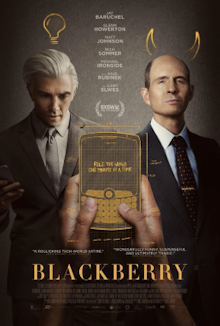As I recently noted, there aren’t that many good films about businesses so it’s heartening that there were two interesting ones in 2023. The rise and fall of the BlackBerry devices should be a familiar one for those of us who lived through the era so it’s great to have the story on film. It’s a fantastically entertaining account too, complete with cinematic embellishments and dramatic flourishes that make it legible to those not technically-inclined or don’t speak business lingo. Unfortunately it’s also probably not a very truthful depiction of events and some parts of it are downright icky. I did love the dynamic they establish between the two co-CEOs but as far as I understand, the characterization is entirely fictional.
Research in Motion (RIM) co-founders Mike Lazaridis and Douglas Fregin pitch their proposed “PocketLink” cellular device to executive Jim Balsillie. The latter is more interested in what is going on inside his own company and barely pays attention. When he is fired for his overaggressive ambition however, he returns to RIM offering to invest money in it in exchange for a share in the company and the position of CEO. The more casual and fun-loving Fregin is opposed but the more timid yet more technically-proficient Lazaridis agrees to share the position of CEO with Balsillie. Though he has no technical knowledge at all, Balsillie quickly takes charge to the business side of RIM, mortgages his own house in order for the company to make payroll and pushes for a quick prototype of their device. Lazaridis insists on putting together a working prototype instead of a mockup and together they pitch the device to Bell Atlantic. The combination of Balsillie’s business nous and Lazaridis’ technical knowledge proves effective and soon the BlackBerry becomes massively successful and RIM grows into a large corporation. They are still stymied by the tight data limits set by the networks of the time and Lazaridis has to poach top engineers from other tech companies to solve the problem. But everyone today now knows, their greatest challenge is the arrival of the iPhone and the rise of Apple.
With a running time of only two hours, this is a very fast-paced whirlwind history of RIM as it needs to encompass both its rise and its equally meteoric fall. The job is made easier by the fact that this is relatively recent history and so most people will already have some knowledge of the BlackBerry device and why it mattered at the time. So when Balsillie pumps his fist and exclaims, “Unlimited free texting, only on BlackBerry,” you know why it’s a big deal. The most fun part of the film however is the dynamic between the two co-CEOs. Lazaridis is the archetypal genius nerd, so attuned to electronics that he is annoyed by the buzzing sound of a poor-made device. Balsillie on the other hand is a hungry shark who lies, browbeats people and ruthlessly cuts deals to get what he wants. The implication is that it took the both of them working together to make RIM successful. There is a rather old-fashioned moral lesson at the end however. Lazaridis, heady with success, abandons the casual, fun-loving atmosphere of the early days of the company and breaks with his best friend Fregin. Meanwhile Balsillie with his newfound wealth, becomes preoccupied by his passion for ice hockey and becomes obsessed with buying an NFL team and moving it to Canada.
It makes for a gripping watch but unfortunately it simplifies and plain makes up so many things that it’s more fictional than not. For example, it’s funny how RIM gets in trouble with the SEC when it’s a Canadian company. It’s just that the SEC is instantly recognizable to audiences and the corresponding Canadian regulator is not. The version of Balsillie that we see here probably has little resemblance to the real person. Nor did Fregin break his friendship with Lazaridis as this film claims as they continued to cooperate on other projects after RIM. I enjoyed the copious references to nerd culture in the early days of RIM but I’m not sure how much of it is actually true. Probably the most offensive of the narrative shortcuts it takes is to piggyback off of the stereotype anything made in China equals poor quality. The implication is that RIM was successful only so long as manufacturing was kept in-house. Obviously whether this stereotype is true or not varies depending on when it happened and the specific project. What doesn’t work is that this film wants to show RIM being felled by Apple, a company which famously does no in-house manufacturing and does a lot of subcontracting to China. It’s an inconsistent and shallow simplification to make it easier to tell a complex story to a general audience.
I still maintain that there is a dearth of good films about businesses and while the story of RIM ends in ignominious failure, I’d consider this to be a rather flattering portrait overall. It shows that neither Lazaridis nor Balsillie alone could have achieved as much on their own. While the fictional version of Balsillie may be as asshole, he was exactly the right person needed to turn RIM into a viable business. Most of all, it shows that the world of business is as full of passion and personal meaning as any other, so yes, it is a worthwhile subject for films and other works of art.
